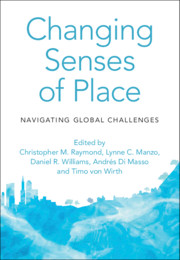Book contents
- Changing Senses of Place
- Changing Senses of Place
- Copyright page
- Dedication
- Contents
- Contributors
- Foreword
- Preface
- Acknowledgements
- Introduction
- Part I Climate Change and Ecological Regime Shifts
- Part II Migration, Mobility and Belonging
- 6 Exploring Senses of Place Through Narratives of Tourism Growth and Place Change
- 7 No One Is a Prophet at Home
- 8 Place Detachment and the Psychology of Nonbelonging
- 9 Sense of Place in Urban China
- Part III Renewable Energy Transitions
- Part IV Nationalism and Competing Territorial Claims
- Part V Urban Change
- Part VI Technological and Legal Transformations
- Part VII Design and Planning Strategies for Changing Senses of Place
- Part VIII Conclusion
- Index
- References
8 - Place Detachment and the Psychology of Nonbelonging
Lessons from Diepsloot Township
from Part II - Migration, Mobility and Belonging
Published online by Cambridge University Press: 15 July 2021
- Changing Senses of Place
- Changing Senses of Place
- Copyright page
- Dedication
- Contents
- Contributors
- Foreword
- Preface
- Acknowledgements
- Introduction
- Part I Climate Change and Ecological Regime Shifts
- Part II Migration, Mobility and Belonging
- 6 Exploring Senses of Place Through Narratives of Tourism Growth and Place Change
- 7 No One Is a Prophet at Home
- 8 Place Detachment and the Psychology of Nonbelonging
- 9 Sense of Place in Urban China
- Part III Renewable Energy Transitions
- Part IV Nationalism and Competing Territorial Claims
- Part V Urban Change
- Part VI Technological and Legal Transformations
- Part VII Design and Planning Strategies for Changing Senses of Place
- Part VIII Conclusion
- Index
- References
Summary
This chapter aims to describe the psychology of nonbelonging through co-constructed accounts by informal settlement residents who belong – yet also struggle to not belong – to ‘non-places’ such as the informal settlement. It illustrates how (non)belonging is performed as unspoken affective senses of place that are resonant in narratives. Using Lacanian psychoanalytic insights, the chapter contributes to an expanded conceptualisation of ‘senses of place’ by showing that we also perform place belonging in an ‘unconscious’ sense – beyond our discursive performances (place identity) or expressed feeling states (place attachment). This epistemological stance highlights senses of place belonging as coordinated via an unspoken social contract with the hovering interlocutor (Other), who offers the navigational cues to situate where we are (place) and to define who we are (identity).
Keywords
- Type
- Chapter
- Information
- Changing Senses of PlaceNavigating Global Challenges, pp. 103 - 115Publisher: Cambridge University PressPrint publication year: 2021
References
- 2
- Cited by

